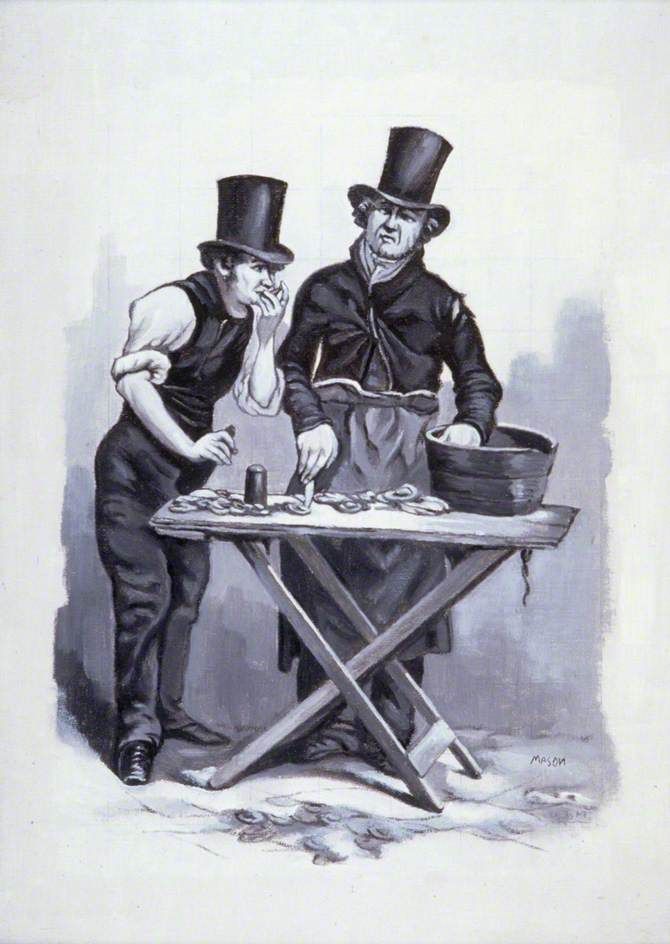There was time in 1820s London when the name of Edward Dando sent panic through the hearts of tavern and oyster shop owners. This young man, in a few short years, had built up a reputation as Britain’s leading restaurant bill swindler. Dando would walk into a restaurant, usually an oyster stall, and eat to his heart’s content before telling the perplexed owner that he was penniless. Predictably, he would be thrashed and thrown out into the streets, and often times handed over to the police. But as incorrigible as he was, Dando, once released, would head straight to the nearest oyster stall and do it all over again.

An oyster bar in London.
Edward Dando was reported to have been born in 1803. Very little is known about his early life, except that he apprenticed as a hatter. It is doubtful whether he put his training to any professional use, for he soon discovered a better means of livelihood—theft.
Dando was not a thief in the traditional sense of the word. He certainly didn’t think he was so. Dando couldn't comprehend why he shouldn't have an abundance of everything, despite lacking the funds to pay for it, when those above him consistently relied on credit to finance their way of living. “I only run into debt to satisfy the craving of hunger, and yet I am despised and beaten,” Dando once told the court.
Dando began his career as an oystermonger when he was in his early twenties, binging on food at different food sellers without being able to afford the meal. He was out of work, yet he refused poor relief, saying he despised it because he “had a soul above it.”
Dando could devour enormous quantities of food. He would regularly gorge on oysters by the hundreds, with several loaves of bread, washed down his throat with copious amount of ale, beer, or water. Dando complained that tales of his extravagant eating was often exaggerated, saying that the most he had ever eaten was three hundred oysters with a loaf and a half of bread with butter. No wonder, The Morning Chronicle once published a cautionary note in bold that read: “CAUTION TO SHELL FISH DEALERS, PUBLICANS, &c. – DANDO THE OYSTER-EATER, ABROAD.”

An oyster seller on the streets.
Dando’s exploits were widely reported in the press and the public devoured them. Once he was arrested for eating 1.75 pounds of ham and beef, a half-quartern loaf, 7 pats of butter and 11 cups of tea. The magistrate sentenced him to one month. While in prison, Dando stole bread and beef from his fellow prisoners for which he was sent to solitary confinement. The day he walked out of prison, he went straight to an oyster shop and ate thirteen dozen oysters and a half-quartern loaf, washed down with 5 bottles of ginger beer. When brought before the magistrate again, he explained: “I was very peckish, your Worship, after living on a gaol allowance so long, and I thought I'd treat myself to an oyster.”
The magistrate sent him to prison for three months and threatened him of transportation if he repeated his crime. But this was Dando we are talking about. On the very day he was released, Dando was caught again after he had wolfed down eleven dozen large oysters, a half-quartern loaf and 11 pats of butter without being able to pay for it. His defence was the same—he was hungry. This time the magistrate, perhaps tired of his antics, let him off. Outside the court, the owner of the oyster stall threw a bucket of water over him and beat him with his cane, “to the infinite amusement of a throng of persons who had assembled outside and who were aware of the prisoner's transgressions”, wrote The Times.
Related:
Tarrare: The Man Who Ate Too Much
Charles Domery, The Glutton
Dando was like a celebrity. His trials drew large number of admirers to the courthouse including oyster sellers and food shop owners, who came to listen to his witty remarks. Once the magistrate asked about his clothing—perhaps he was too well-dressed for a vagrant—to which Dando replied: “The jacket, I think, came from Brixton; the waistcost ... was bestowed upon me at a similar establishment at Guildford; and the trousers I know I acquired by hard servitude in your Middlesex house of correction. I am indebted to the City authorities for the rest of my wardrobe.”
Dando died in 1832 after he caught cholera at the Coldbath Fields Prison, but his fame continued to spread. Obituaries were published in almost all the local papers. British novelist, William Makepeace Thackeray wrote The Professor, a short story loosely based on Dando, which was turned into a play about his life, Dandolo; or, the Last of the Doges and was staged at the City of London theatre. Charles Dickens compared Dando with Alexander the Great, writing that “Alexander wept at having no more worlds to conquer, and Dando died because there were no more oysters to victimise.”
Numerous poems and street ballads written about him, as well as several caricatures. James Catnach published the most popular of these ballads titled The Life and Death of Dando, the Celebrated Oyster Glutton:
One day he walk'd up to an oyster stall.
To punish the natives, large and small;
Just thirty dozen he managed to bite,
With ten penny loaves—what an appetite!
But when he had done, without saying good day,
He bolted off, scot free, away;
He savag'd the oysters, and left the shell—
Dando, the bouncing, seedy swell.












Comments
Post a Comment